This is an entire posting elaborating on a comment I made over at pharyngula, regarding whether AI “creativity” poses a problem for great artists.
It’s tempting to say that a Caravaggio or Da Vinci has nothing to fear from an AI like midjourney, or a genius pundit like Jordan Peterson is not threatened by chatGPT. The problem, however, is deeper than that: if a million monkeys occasionally type out a screenplay for Romeo and Juliet they are not outputting the quality of Shakespeare, but they might overwhelm Shakespeare’s voice in the public arena. You don’t have to be better than Shakespeare, but what if you’re merely adequate and are able to bump your performance a few levels by using AI? Our problem, in other words, is not at the high end of the spectrum, it’s solidly in the middle. This posting will have some large blocks of text to illustrate, I apologize, but it’s necessary. In order to understand, please wade through them. I think you’ll find it thought-provoking, at least.
Let’s start with the end of a conversation with ChatGPT:


Midjourney AI and mjr: “Marbot of the space marines.”
By the way, you have to love how ChatGPT accidentally(?) homes in on the crux of the issue: John Ringo is a “prolific and successful author” but ChatGPT did not say Ringo is a good author, or a great author, or an interesting author, or anything more than a hack. I asked it and, as usual, it dodged behind its “As an AI language model, I don’t make judgements…” routine.
If you want a bit of background reading for this post, you can refer to an old post I made in 2017, where I quoted at length a passage from Baron De Marbot’s memoirs of the napoleonic wars. Marbot is a fascinating literary character because he’s not only a great source on life during the napoleonic period, he’s a reconteur extraordinaire of some things that happened to him, which have been confirmed to have been actual events. [stderr] As I mention in that posting, Marbot’s shako, which he describes as taking a terrific cut from a sabre, is in the Musee Des Invalides in Paris – bearing the aforementioned sabre-cut. In fact I remember as a kid, before reading Marbot, thinking, “ow that looks bad” and later, I read about how it was, in fact, bad. The posting I reference above includes a lengthy chunk from Marbot’s memoirs, describing how he rode into an entire Russian corps on his evil mare Lisette(tm) and retrieved the battle flag of a French unit that was being overwhelmed. It was an amazing feat of derring-do, which nearly cost him his life.
Things begin innocently enough:

Uh, um. Naturally, someone fed ChatGPT with all the books in a few libraries, so Marbot’s memoirs went into the tokenizer along with everything else. I admit I was surprised, but I had been prepared to block-quote chunks from the memoirs at the AI. Turns out that was not necessary.
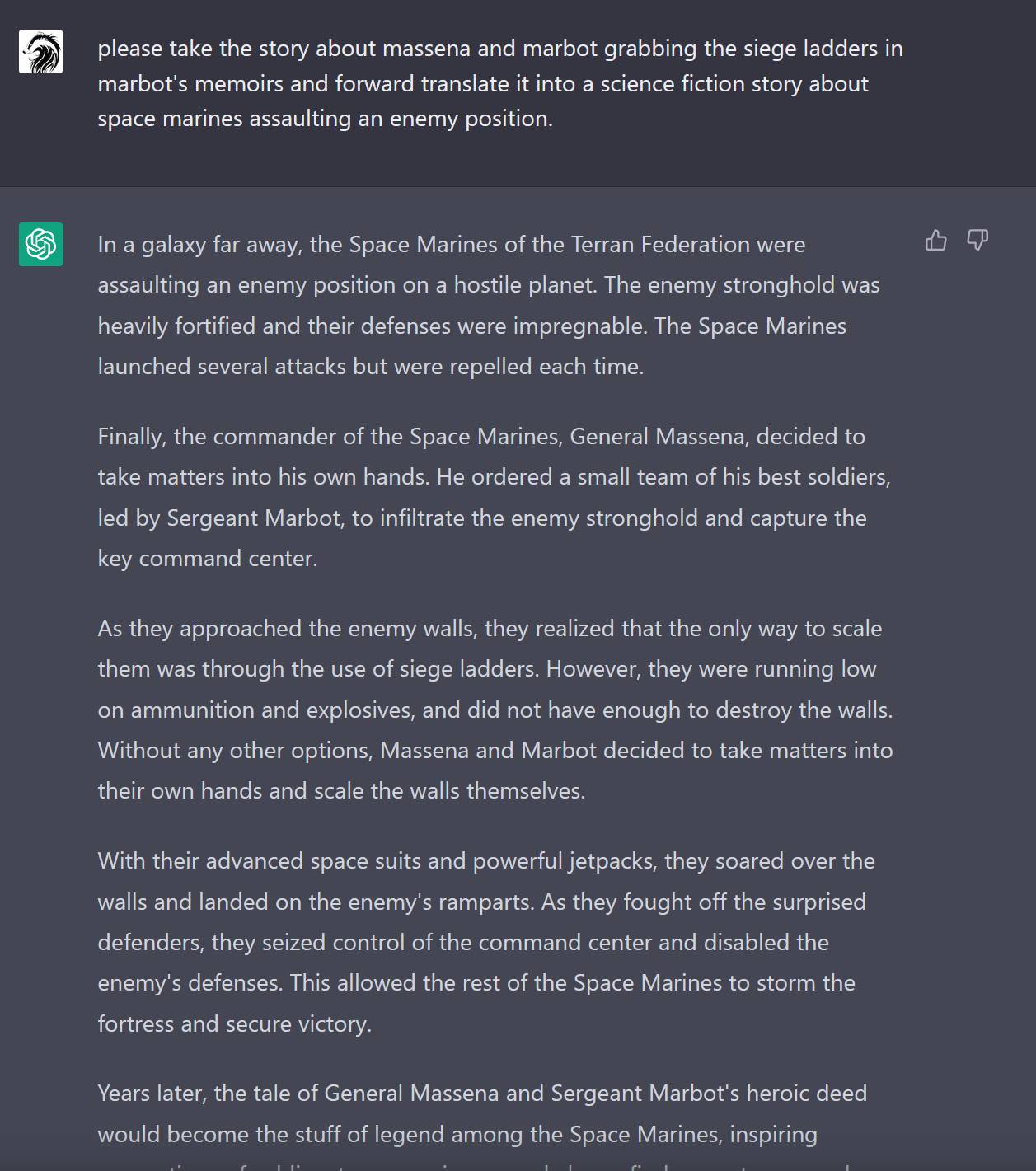
… and so on.
Is it great writing? No. Is it on par with Marbot’s? No. Is it on par with John Ringo? Maaaaaaaybe not. But could it do the heavy lifting to devise a few scenes that a hack writer of MilSF might upload into their next book? Uh oh.
See where I am going with this? The AI is a threat to great writers? Probably not. But it might help level up an army of mediocre writers that bury the voices of the great writers in a massive tsunami of MilSF that has been transcoded from actual historical events into interesting moments for their next pot-boiler. I was tempted to start cross-platforming the last stand of the Kusunoki clan from the Gempei war, but decided to stick with Marbot because there are so many fascinating events in his memoirs:
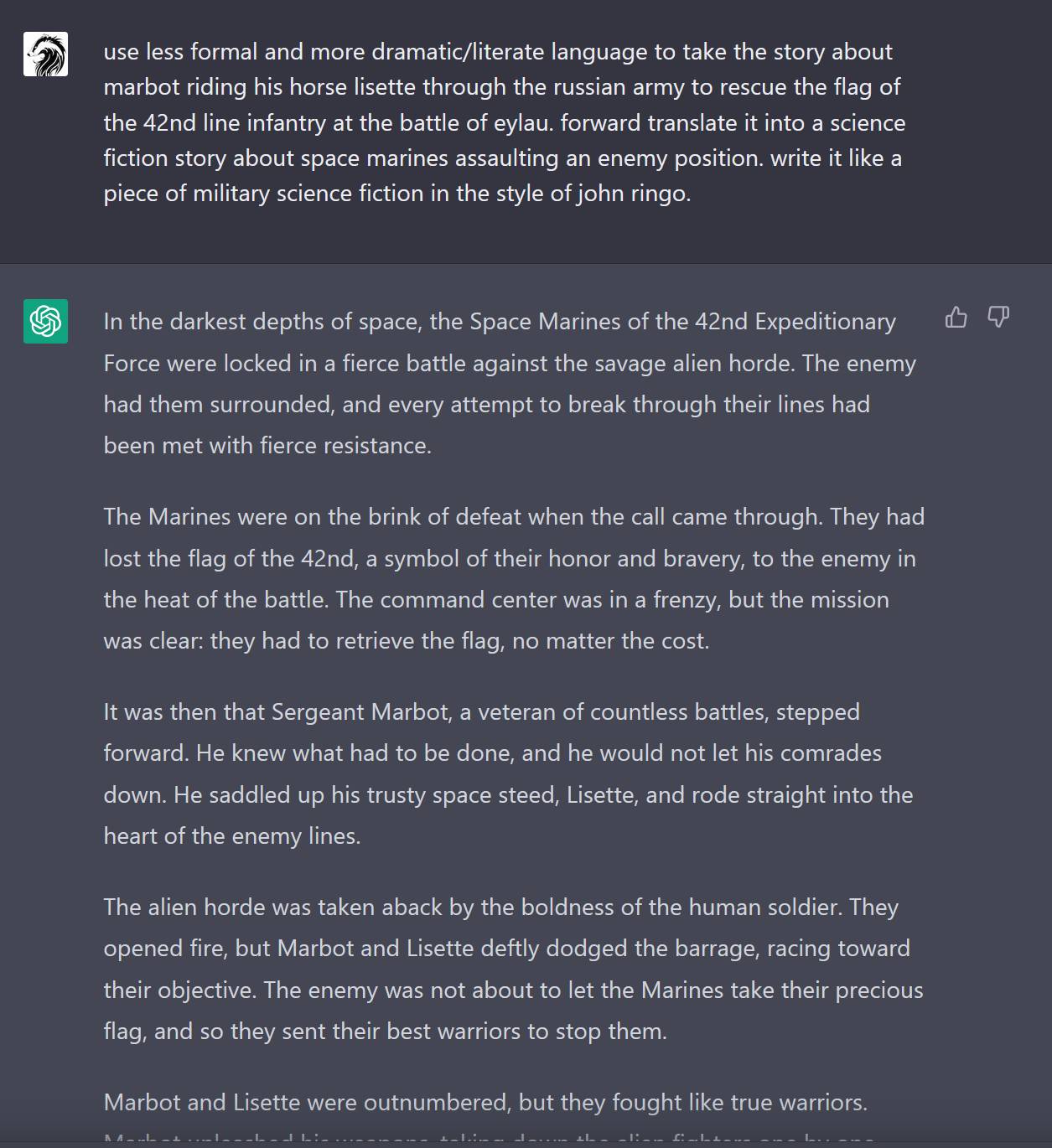
Of course, it’s not Ringo. But I find this all to be interesting. If I were a hack MilSF writer, and had a publishing house and an army of devoted fans who could shove whatever crap I wrote over the line to a Hugo nomination, I might.
I’ll also mention as an aside, I thought about asking it to write a Marbot story “in the style of Chuck Tingle” but I decided, for once, not to pursue my whims to their inevitable dark alleys.
I decided to punch up a bit more Ringo: Set the Ringo knob at 10.

Let me add that I am impressed by the way the AI maintains context. I do not have to repeat the prompt – like a human (better than some humans) it remembers what we were discussing and resumes where we left off. These prompts happened over the course of a day of me having another idea and dashing off a bit more text at ChatGPT.

Midjourney AI and mjr: “Marbot of the space marines at the battle of Eylau”
I should mention that this text turned out to be difficult to hand to Midjourney to render as art, because words like “cutting” and “gore” are blocked. I find that incredibly stupid, of course, because it forced me to change “gore” to “wrack and ruin” and so forth. Also, Midjourney does not seem to like big battlefield scenes. I am guessing it has to do with some sort of average of what heroic illustration looks like: we are usually focused on the individual hero rather than the mass of fighting, scrabbling, bleeding people. Naturally, I had to collect a small folio of paintings of horrific napoleonic battles and feed them to Midjourney, because that is the kind of person I am.
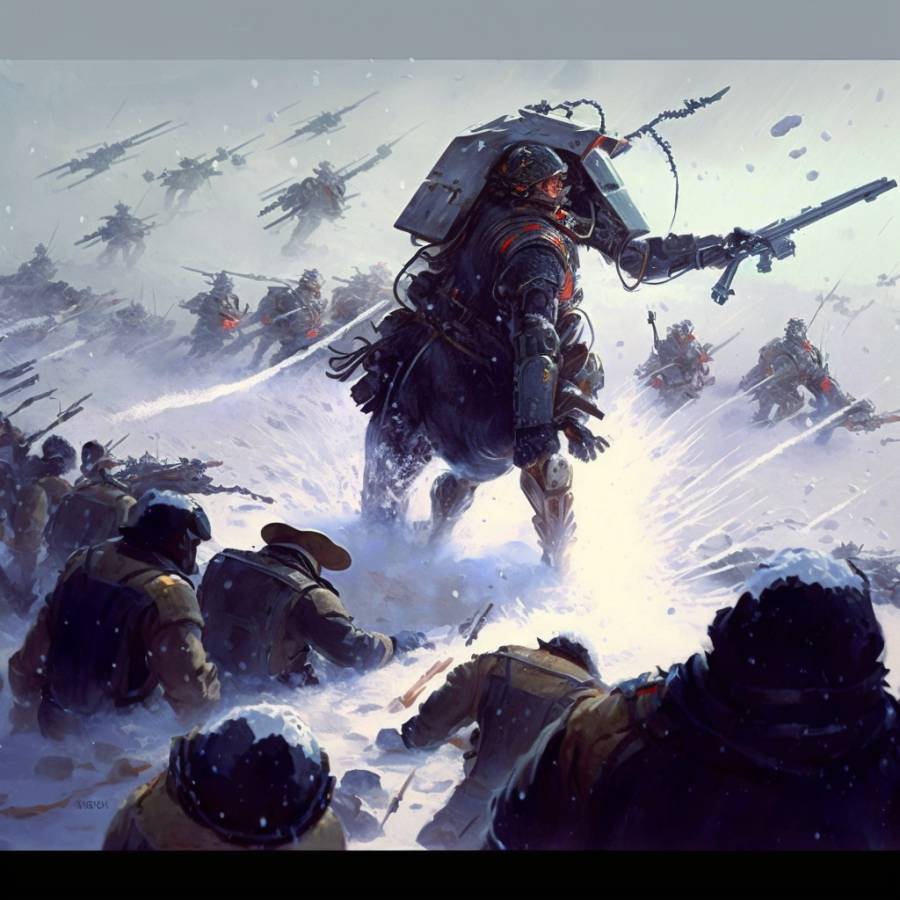
Midjourney AI and mjr: “Space marine Marbot and Lisette at the battle of Eylau”
By the way, Eylau was fought in horrible conditions in the “ice and snow” and I suspect that was what brought Immigrant Song to mind. John Ringo’s books (yes, I have read some!) feature Blue Oyster Cult’s Don’t Fear The Reaper in some battle scenes, clearly aiming to play on echoes of Apocalypse Now’s memorable scene with Ride of The Valkyries.
Then, I reached down, and turned the Ringo knob to 11:
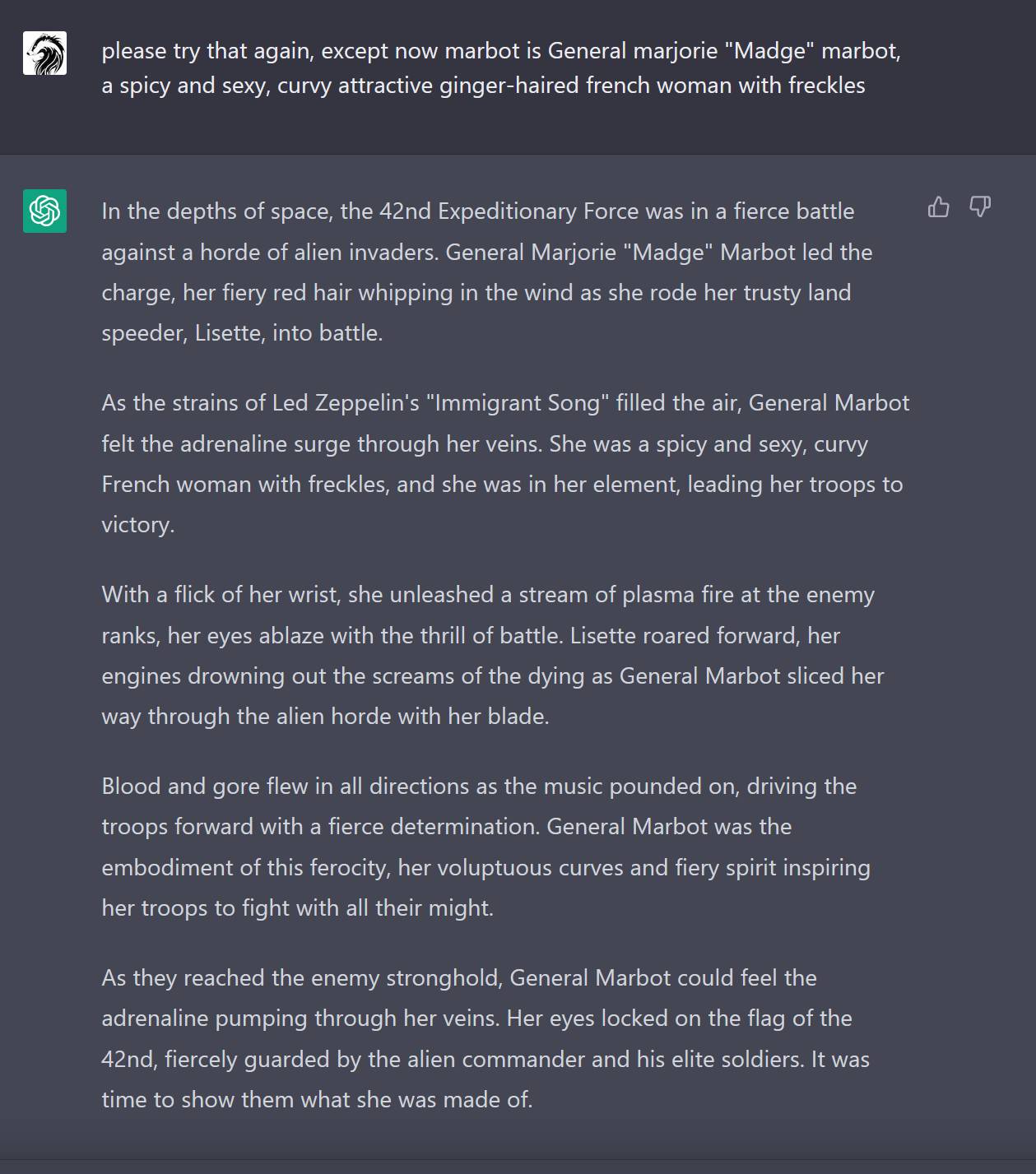
I feel my Hugo is dancing just within reach of my fingers. That is some truly mediocre MilSF. By which I mean good writers like E.B. Sledge or Marbot are in no danger, but I could see how this kind of glarp could “flood the zone” I did not include the entire text chunk for purposes of brevity, but the AI makes a point (Ringo-like) of repeatedly dwelling on the hero’s sexy curves and so forth.
In the discussion about AI over at Pharyngula, one point that occurred to me was that AI are going to have (for now) a problem with being right about things, in fields where there is an objective criterion for right or wrong. An AI cannot bloviate about the nature of dark energy or the volume of a rotational curve: there are verifiable answers. But I hypothesize that fields lacking objective criteria are going to be very easy for AIs to fudge responses into: marketing, psychology, philosophy, MilSF, screenplays, presidential speech-writing, on and on. A friend of mine and I have been playing with asking ChatGPT to write code for us, and have been enumerating the critical mistakes it makes. Perhaps ChatGPT can design a website that looks interesting, but when I asked it to write a C function that added a struct Node to the end of a linked list, it appears to have assumed I meant a struct Node * and accessed its member fields via pointers (instead of allocating memory and initializing a copy) C has objective criteria for good code and bad code, but speechwriting and MilSF do not.
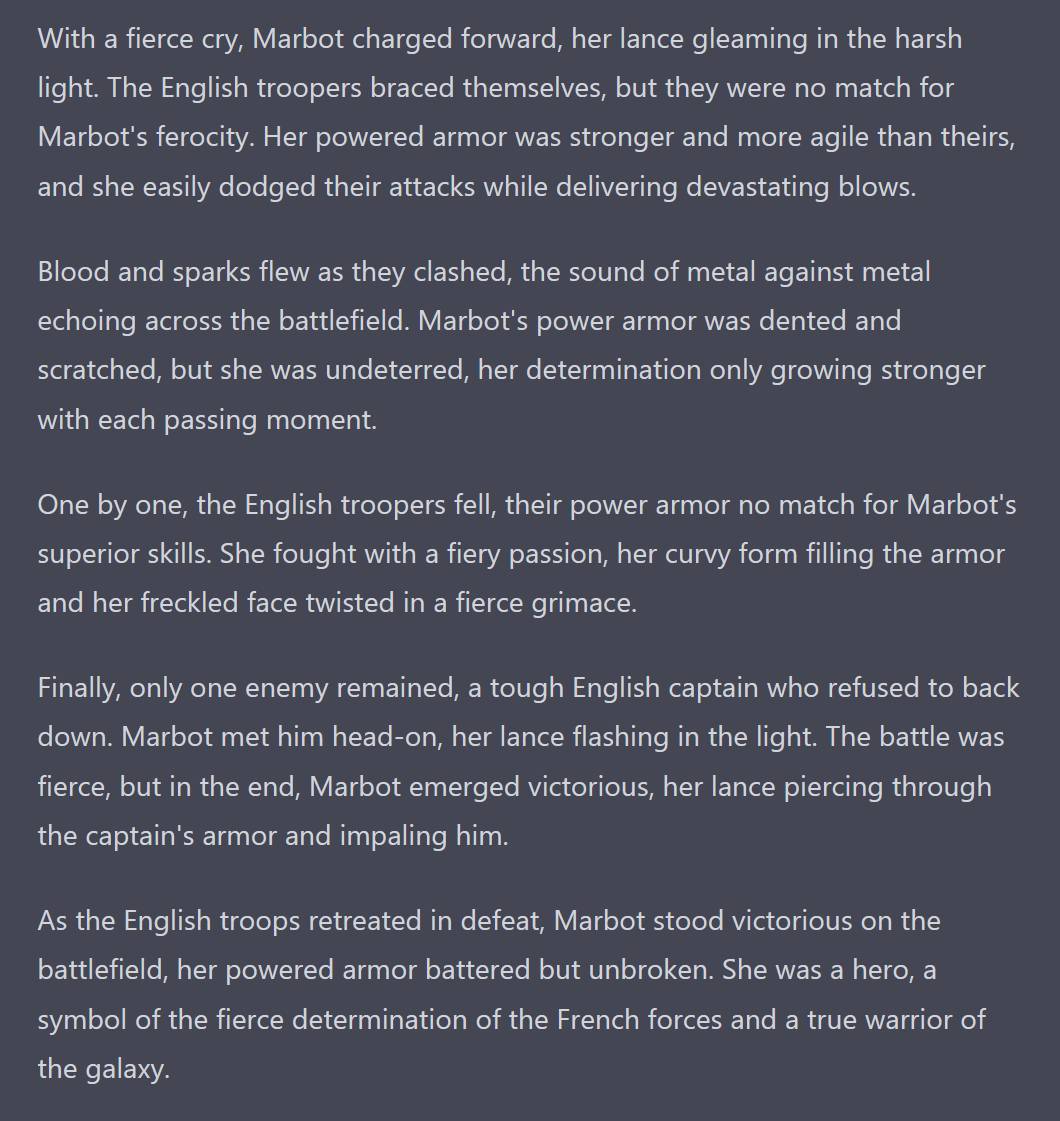
It’s great to know that someone in powered armor is curvy. Personally, I always assumed that someone who was fighting an extended battle in powered armor probably smelled like goat: sweat and pee – not Chanel #5. The little vignette above is interesting: I specifically asked for the sabre-duel with the 3 English hussars from Marbot’s account of the campaign in Spain – and instead I got a powered-armor lance fight.
I trust I’ve made my point, though: AI can be used as a tool for elevating mediocrities and, as such, it’s not just a threat to the mediocre, it’s a source of infinite noise.

Until they became intensely boring, I read a few of the “Horatio Hornblower in space” MilSF “Honor Harrington” books. My suspicion was that the author was lifting events from actual history (loosely) – he certainly lifted political events and names (Saint-Just being a French politician of the revolutionary period, as well as a dictator in the SF series). I asked the AI to write me a sketch of the battle of Thermopylae as a space marine drama, and it did a credible job – and then it made Marbot the leader of the space marines, since I had forgotten that this vignette was part of the query-trail from the Marbot’s memoirs. Interesting. I didn’t get to the part where the giant insect-swarm overwhelms the brave troopers and rips their curvy bodies apart.
My favorite take on the whole “space marines” trope is John Steakley’s Armor, which I discovered by accident at a high school book fair. It’s an interesting take on the whole thing, and it manages to exude a sense of the endless despair of fighting an enemy that does not understand how to lose.
I now feel tempted to start forklifting characters from napoleonic military history into warhammer armor. Ugh. I’d have to collect reference images.
I have also done some experiments with having ChatGPT translate things into Jordan Peterson. What the heck, I will post one here:
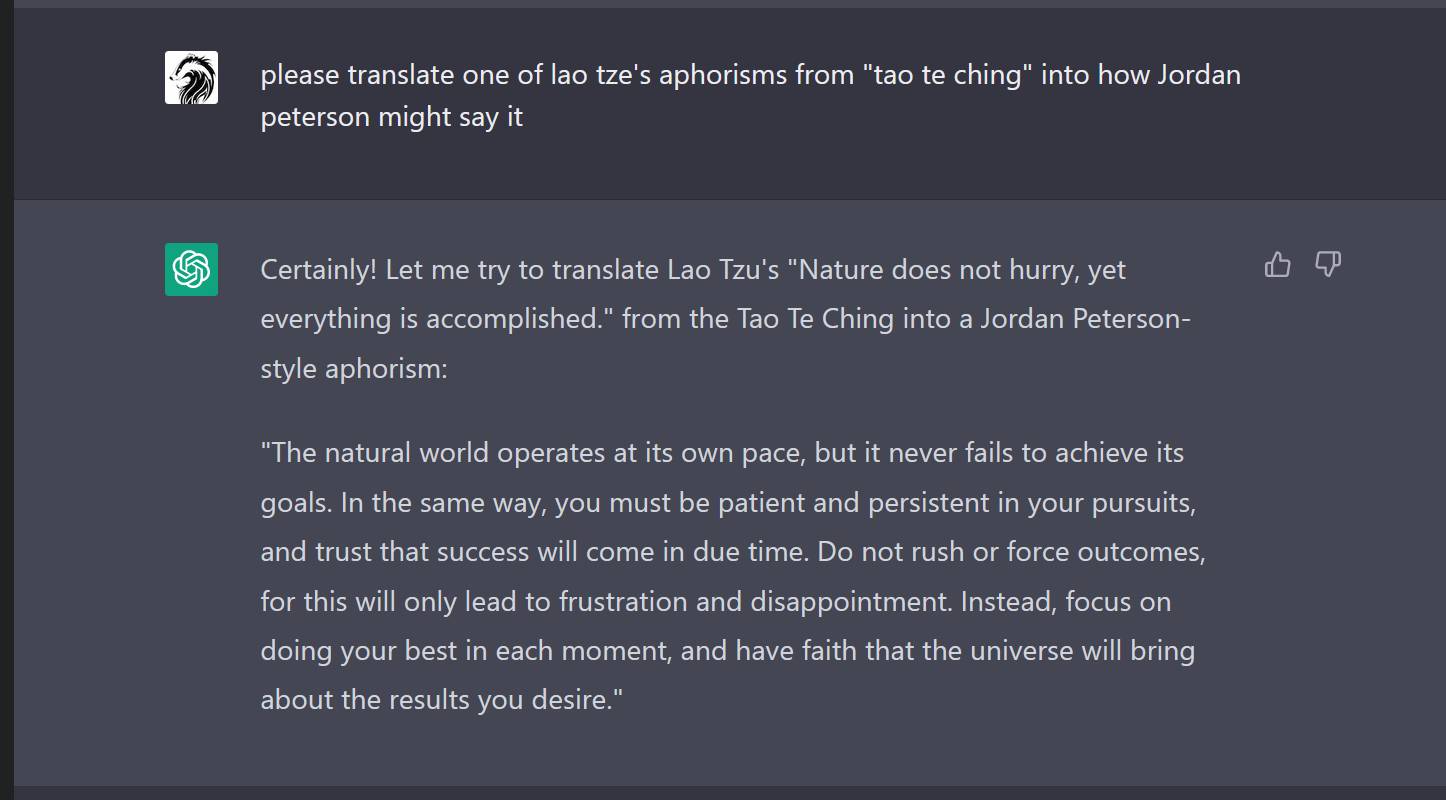

She was a spicy and sexy, curvy French woman with freckles, and she was in her element, leading her troops to victory.
I s’poze it would violate ChatGPT’s First Law of ‘Botics to depict her in the classic style of Frenchwomen leading troops to victory, with one breast exposed.
One benefit of these text generators – I had to laugh a couple times at how context insensitive these supposed AIs are – is that they should make the “It was a dark and stormy night” competitions defunct.
I’ve avoided Jordan Peterson, but I can see a great future for the AI writing those spiritual/inspirational books typically ending up in the bathroom.
@flex: my copy of Le Guin’s Tao Te Ching lives on my toilet tank. No JP for me!
It’s all well and good to make fun of AIs making pics of people with seven fingers or creating mediocre prose that could enliven a whole cadre of Amazon self-publishers in obscure genres, but what happens when they start designing bridges and other major infrastructure, and no one is there to double check the work because (naturally) the owner’s of the firm insist that it would be too expensive to do so, primarily because you can’t (yet) hire engineers at minimum wage?
Forgive the punctuation errors above. Sorry…
One thing that I expect to see with this sort of writing AI is people using it to bulk up a book. The author writes a one page description of a battle and has the AI turn it into a several page chapter. School students are going to do the same thing a lot. Need that report to be 3 pages and you only got 2 pages of material? Feed it into the AI and have the AI read it back out to you with more explanation.
As for programming, C is a hard case for an AI. Given a problem there are going to be multiple technically correct solutions, which of those is stylistically best is a matter of opinion and context. There is also going to be a pile of nearly but not exactly correct solutions and a bunch of correct in abstract but incorrect when dropped into an existing program solutions. A language with fewer different ways of doing the same thing, less style options and less legacy weirdness will probably produce better code from an AI.
My real fear for AI programming is security holes. I expect a large AI program will have some scattered about because it isn’t thinking about what it is doing. I can already see some of the better organized computer crime syndicates seeding the AI’s source code with holes and then fishing for those holes in production code.
Are the Midjourney images presented in the order they were created? I, being familiar with scifi but largely ignorant of French military history, would have guessed that “Marbot” was a robot, and you can guess how I would have mispronounced it.
Thus, I am curious as to whether the second image, in which Marbot is depicted as a robot, was the first generated.
John Ringo and Paul George should collaborate on some Milscifi featuring a futuristic NBA star.
So you’re saying Games Workshop are going to start using AI for their books? :P
I still think the main use for it anytime soon will be spam
What worries me is that I’ve already seen AI generated web pages purporting to answer “how to” type questions, and gettingm things miserably, dangerously, but to the uninformed plausibly, wrong.
Someone’s going to lose a finger because they listened to an AI tell them how use a table saw and didn’t know it.
Marcus, don’t you have something to weld or forge or cast?
Made any soap recently?
Interestingly, the AIpocalypse is indeed now. Valkyries are go.
Google has become noticeably worse in the last several months, in part by making themselves more “user friendly,” causing more useful results to get disappeared, while sheisty SEO gaming websites written by AI get elevated excerpts. Just yesterday I found a correct answer to a tech question inside an article that was blatantly written by AI, with how much it repeated itself, belabored and delayed the point, and walked on eggshells around big brands.
Meanwhile, asking the questions of ChatGPT you once would have asked of google can often get better results, within its remit. Like, honestly, answers that are so plausible they’re almost certainly true. But how can you corroborate them? ChatGPT can’t give you sources and Google is worse than ever.
We’re in a territory where the best truth the internet can give us is straight out of the mouth of a literal bullshit machine, while the font of all things we’ve relied on for decades let algorithms steer it into an inescapable morass.
I’m not egregiously harmed by the situation now, but it’s fucken wild to behold.
@GAS: there are search engines other than Google. I’ve been mainly using DDG for years, because it’s less stuffed with paid advertising masquerading as search results.
In the olden days (late 90s) there was a plethora of search engines – altavista, lycos, yahoo, others I can’t remember. Then there were meta-search sites like dogpile that aggregated searches from all the good places. Then it gradually became apparent that consistently the best search results from meta-search sites were the ones from Google, so people just started going straight to Google. The market worked.
In an ideal world, if Google borks search and there’s a better alternative, sooner or later everyone will simply migrate to that instead. I look forward to a time in the future where people fire up DuckDuckGo or similar and say “I’ll just Google it”, and don’t really remember why that’s the verb, in much the same way as my kids called the Dyson vacuum cleaner “the hoover”, having definitely never in their lives ever having seen any product manufactured by Hoover.
Of course, that presupposes that people can tell that Google’s current offering is borked. When they were better than the competition, it was obvious. I’m not convinced enough people can even discern that there’s something wrong with Google now.
Of course, it doesn’t help that Google is embedded as the default search option in the overwhelmingly most popular web browser, which is itself the default browser for the most popular smartphone OS. Kinda makes MS’s bundling of IE with Windows back in the day look pretty pedestrian…
David Brin wrote a blog post on AI with an interesting idea: what if we trained an AI to recognize AI output so that fakes could be identified? Seems like a punishment that fits the crime. 8-)
I had a conversation about this with a co-worker recently. He had used ChatGPT to write a business email – basically an eloquent request for payment of an outstanding invoice. He said it was great: he gave it like two sentences of prompts, and it spat out a full page of well written and professional dialog.
My resposnse was: So you’ve got a tool that can turn basically six data points (customer name, customer purchase order number, amount outstanding, date payment was due, address to send payment) into a full page of text. That’s fantastic, now your customer can go into that page of text and hunt down the six important items themselves. This is going to be great – especially when everyone is doing it. Emails that should be a couple sentences long can now be filled with hundreds of superfluous words that you’ll have to sift through to find the valuable information. Once everyone is doing this, there’s going to be a great market for AI-based tools that can summarize – or basically recreate the input prompts – the output of another AI.
So even more than it is now, the Internet can just be AIs arguing with each other, sending each other flowery requests for payment, legal threats, responses to legal threats, etc….
Which caused me to come up with an idea for a SciFi piece. What if the way the AIs take over after the singularity isn’t by military conquest or our devices suddenly going rogue: what if it’s by middlemanning all our communications and subtly pushing humanity in the directions it wants us to go by a series of subtle ‘inevitable AI transcription/translation errors’ that work in its favor. Sure, it can’t change “Send 500 units widgets to Wisconsin factory” to “nuke moscow”, but what about just shading the emotional tone of things in a way that subtly influences the recipient in ways not intended by the human sender?
Seriously: I heard the phrase “bullshit fountain”, and thought it apt.
i love that idea snarkhuntr, but what would the AI be socially engineering? what agenda would be the most funny, interesting, or thrilling for them to be pursuing in the story?
I just want to point out an interesting commentary from Talking Points Memo about AIs. AIs are good at sounding real. But, when it comes to sources, they are also good at making up sources that sound real, but aren’t. I’m talking about journal articles here. They “know” what academic article titles look like, and what journal names look like, and they duplicate that without requiring that those articles or journals exist. To me, that is really, really scary.
Article here: https://talkingpointsmemo.com/edblog/a-bit-more-on-the-ai-inaccuracies
ahcuah #20
Ah.
OK.
So it’s already too late?
I have a short fiction story I want to write about this but my fiction skills suck. So do I ask an AI to flesh out my plot “in the style of william gibson” or “in the style of john ringo”? Decisions.
I wonder what the AI would do if you told it to write in the style of William John Gibson Ringo Connie Willis?
Would it render a mishmash of SF authors, since it’s not going to notice that it’s three different authors names? Does the AI notice or comprehend voice? Can it distinguish between authors based on writing style?
I don’t find technology a threat to art. It doesn’t do anything artfully, but it does produce interesting results given the right input.
Well, it’s a bit like those Midjourney pics you posted lately.
They could be used by a good artist as a starting point, sparing them some preliminary spadework (mind the finger count tho).
AND they could be used as they are, as sellable art, by someone not caring much about quality, for someone ditto.
The SF-esque bits you just elicited sound good enough for certain kinds of publication, with some polishing. The level is what it is, but they remind me quite a lot of EE Doc Smith’s stuff, minus the ridicolousness.
So yes, we are probably at the preliminary tremors of a tsunami of AI-generated crap. But really, who’s going to read/watch it? There’s way too much stuff available right now, so the only solution is gonna be… use bots to watch/read it!
A perfect circle of rubbish, generated by bots, contemplated by bots, with no connection to reality whatsoever (the only downside: might eat a lot of bandwidth, all for nuthin).
Say, that sounds like a good idea for a dystopian SF story about the crash of the information grid. Now if I just could write.
Whoa, this just in.
Marcus Ranum is Marcus Prophet from now on:
https://boingboing.net/2023/02/21/sci-fi-magazines-are-getting-inundated-with-ai-fiction-submissions.html
incoming waves ahoy.
I know it is totally off-topic, but when I saw the title of your post, the first thing that came to mind for me was the scene in Tombstone where Johnny Ringo and Doc Holliday do their dance. “Say when.”
I know it is totally off-topic, but when I saw the title of your post, the first thing that came to mind for me was the scene in Tombstone where Johnny Ringo and Doc Holliday do their dance. “Say when.”
I love that scene. Kilmer’s Doc is a truly scary nihilist.
I remember some interview with Kilmer where he said he got that speech interpretation from a waiter at a Waffle House in Savanna – he had been sniffing around for local color and spent the whole day sitting and listening to the man’s speech.
Ringo: “Won’t anyone play for blood?”
Doc: “Why, that’s just my game.”
chigau@#12:
Marcus, don’t you have something to weld or forge or cast?
Made any soap recently?
I made a big batch of liquid soap the other day and it came out great. And, I build another forge (!) this one out of angle bracket, threaded rod, and foam blocks. I plumbed it up yesterday and fired it and it screamed right up to welding temperature. Success! And I did a blade with a wrought iron spine and a 1095 edge.
I haven’t been posting about those things because, I dunno, my crafty projects seem less than interesting to the commentariat. I’ll try to post a few things maybe.
outis@#25:
Marcus Ranum is Marcus Prophet from now on:
https://boingboing.net/2023/02/21/sci-fi-magazines-are-getting-inundated-with-ai-fiction-submissions.html
It seemed inevitable.
It also appears that art sites are getting bludgeoned with AI art. I saw a few postings on youtube about “how to make a fortune selling midjourney images.” Ha, that market will glut so fast it’s not funny.
@29: It used to take centuries to go from the development of a new form of art to its commercial debasement into complete crap, now we can do it in mere months. See, AI has made us vastly more efficient!
@28: Combine interests. I saw an article the other day where a brewer asked ChatCPT for a beer recipe. You could sound out these AIs for project ideas, and then see if they are actually feasible.
This Vancouver Island brewery hopped onto ChatGPT for marketing material. Then it asked for a beer recipe
@29 and @30:
it’s all over the place, and it started some time ago already it seems:
https://www.theguardian.com/technology/2023/feb/21/sci-fi-publisher-clarkesworld-halts-pitches-amid-deluge-of-ai-generated-stories
https://www.theregister.com/2023/02/22/clarkesworld_ai_spam/
also, it seems that students here and there are submitting AI-essays generated essays:
https://www.vice.com/en/article/m7g5yq/students-are-using-ai-to-write-their-papers-because-of-course-they-are
Yeeesh, you’d wish our species were a little less efficient when it comes to generating crap. Ah well.